If this is the page you arrived at, then please go to http://www.anorakzone.com/twilightzone1985rank1.html for a far more updated look at the 1980s Twilight Zone Following on from the so-so successes of the movie, CBS got interested in resurrecting the series and greenlit a revival in 1984. Watched today then the 1980s seasons don't always look that great... shot on film but then transferred to video to make special effects cheaper, the video footage has worn badly, even on DVD. The footage looks even worse when viewed in the UK, with the conversion from NTSC to PAL systems rendering the entire picture muddy, to say nothing of the permed mullets, shoulder pads and frequently cheesy music. Probably the biggest difference in style though was in the writing craft. The 1980s often gave us people who had real conversations about everyday things, with prostitution and child molestation just two unlikely topics in these episodes. There's an attempt at more naturalistic dialogue and wider locations, whereas the original series was written like theatre productions for the small screen. Below the individual seasons are covered in more depth... SEASON ONE: Twenty four episodes ran from 27 September 1985 to 11 April 1986, with 59 individual stories spread out amongst them. Some of the stories (such as the worthwhile A Small Talent for War in episode 15) are just scraps, not even lasting for ten minutes. However, despite this, season one actually starts off quite well. (A then virtually unknown) Bruce Willis stars in the likeable opener about a man split in two, with Wes Craven behind the lens. The second story is just as good, albeit reminiscent of some classic series episodes, as a mother finds she can stop time. In one of the most eerie and memorable conclusions ever, the story takes the mid-80s cold war concerns about nuclear armageddon and leaves us with a chilling shot of a nuclear missile hanging frozen in the sky. Such an iconic closing shot almost allows you to forget the amount of people throughout the episode seen moving, including Joshua Harris as the family son, clearly laughing on camera. The quality continues, with a man who learns that English has been rewired, a man with the ability to heal, disaffected 'Nam veterans and many more. Yet when we get past the first half a dozen or so episodes... the quality control varies. The series becomes less recognisably like The Twilight Zone and the growing need for post-modernism and silliness begins to unhinge the entire thing, with almost a third of the stories tongue-in-cheek pastiches. A Day In Beaumont, one of the last stories, is a spoof of 1950s sci-fi movies... but by that time you may just be wishing that they'd had the nerve to continue with straight SF, rather than parodying their own genre for cheap laughs. Even worse, by some of the middle episodes, then the basic storytelling tenets of "beginning-middle-end" seem to have eroded altogether. When the season has ended, the quality control has slipped so much that there's almost twenty weak stories, and you're just left with a generally flaccid show that started off well, but ended up as hit-and-miss on a week by week basis. As the talent behind season one included Harlan Ellison, Ray Bradbury, Arthur C. Clarke, Theodore Sturgeon, Joe Dante, Stephen King, Piper Laurie, Martin Landau, Giovanni Ribisi and Helen Mirren then there's sadly a considerable gap between the talent involved and the output achieved. Let's not even mention those two episodes with "Irish" accents... 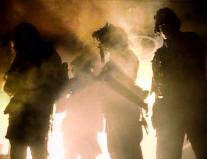 Classic Episode: Nightcrawlers Classic Episode: NightcrawlersOriginal Air Date: 18/10/1985 Writer: Philip DeGuere (story by Robert R. McCammon) Director: William Friedkin Synopsis: My overview above may have been a little harsh, because there are some truly terrific episodes of the 1980s series that can rank up there alongside the original show. Indeed, a remake of Shadow Play even manages to better the 60s version, while the superb Paladin of the Lost Hour returns to the theatrical writing tradition which a lot of the 80s show foolishly abandoned. For ideas there's the kooky innovation of A Matter of Minutes and for pure quality, there's this. If there's one criticism of Nightcrawlers, directed by The Exorcist's William Friedkin, it's that it can feel less like a Twilight Zone, more like a superb short in its own right. Rating: * * * * * 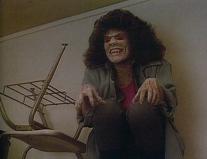 Not-So-Classic Episode: Teacher's Aide Not-So-Classic Episode: Teacher's AideOriginal Air Date: 8/11/1985 Writer: Steven Barnes Director: B.W.L. Norton Synopsis: Many of the "comedy" episodes from season one could have made this list, chief amongst them the woeful Act Break. However, Teacher's Aide takes the crown for sheer ludicruous scale. In its defence it isn't played with tongue in cheek like most of the later season one episodes, and Adrienne Barbeau accredits herself well in the lead role. But an 80s highschool with the world's campest "gang" and a teacher who transforms herself into a rampaging gargoyle... it's just too silly for words, though a guilty entertainment nonetheless. As an example of the differing quality of the season, this featured in the same episode as Paladin of the Lost Hour. Rating: * SEASON TWO: Season two discarded a lot of the excess and silliness that had made season one such a painful watch at times. Sadly though it added nothing new to the mix, and the highs were not as high, meaning it was a consistently mediocre season. After clashing with CBS over what he could include in an aborted Christmas special, Harlan Ellison had left the series as script editor, and the show's ratings continued their downward trajectory. With fewer and fewer people watching, CBS pulled the plug after just eleven episodes. Airing from 27 September 1986-21 February 1987, then finishing from 21 May-17 July 1987, the episodes contained 21 separate stories, with three of them as a single story in a half hour format. There's no particular stand outs in amongst the run here; season two of The Twilight Zone isn't must-see television, but "catch it if you happen to stumble across it" viewing. 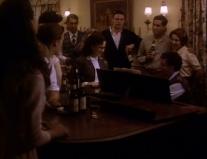 Classic Episode: Time and Teresa Golowitz Classic Episode: Time and Teresa GolowitzOriginal Air Date: 10/7/1987 Writer: Alan Brennert (story by Parke Godwin) Director: Shelley Levinson Synopsis: Time and Teresa Golowitz is the pick of the bunch here, just edging out Aqua Vita. Okay, the ending maybe gets a little schmaltzy, but this is a thoroughly likeable tale about a dying man given a chance to go back in time by the Devil and relive some event in his past. He chooses a high school party with the intention of sleeping with one that got away, only to discover that it not only feels wrong when returning as a much older man, but that his true destiny is saving a girl who committed suicide that evening. By old series standards it's average stuff at best, but in amongst the rest of season two it's as near to a standout as you'll get. Rating: * * * * 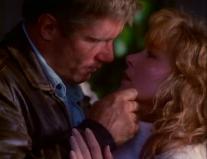 Not-So-Classic Episode: Nightsong Not-So-Classic Episode: NightsongOriginal Air Date: 11/10/1986 Writer: Michael Reaves Director: Bradford May Synopsis: Dreary season two only has a handful of notable episodes, but plenty of lacklustre, below par efforts. Indeed, the two stories following this one were almost my pick - The After Hours for simply being awful, and Lost and Found for, at less than six minutes long, being an underdeveloped scrap of an idea. Nightsong, however, takes the prize. While the revival series was capable of bringing in solid actors, in general they were strictly C-list. That's never more the case than here, with Antony Hamilton turning in a performance that appears to verge on parody in a story which signposts its "twist" ending heavily. Even worse, with the chemistry-free "romance" angle and the laughably dated 80s incidental music, you can't help but feel that you've switched on a bad adult movie by mistake. Rating: * * SEASON THREE: CBS continued the series with an all-new production team in Canada, lots of the episodes being uncompleted ones from season two. With thirty episodes made up of single, 30m stories, the most prominent new writer was future Babylon 5 creator J. Michael Straczynski, who wrote eleven of them, in addition to script editing the season. Charles Aidman was replaced by Robin Ward as the series narrator, and the extended lifespan of the show meant that it finally had enough episodes to enter into lucrative syndication packages. Airing from 24 September 1988-15 April 1989, season three saw the series fulfil its possible financial obligations then get rested permanently. It took thirteen years before the idea to bring back The Twilight Zone was mooted (and failed) once again. Like season two it can look a little cheap, and some of the stories and actors are nondescript. (Though the likes of Janet Leigh and Dean Stockwell raise the bar somewhat). However, after a faltering start the season entered a consistent level of quality that offered few surprises, but was passable entertainment. 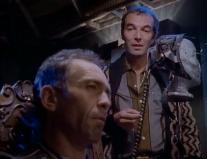 Classic Episode: The Mind of Simon Foster Classic Episode: The Mind of Simon FosterOriginal Air Date: 18/2/1989 Writer: J. Michael Straczynski Director: Doug Jackson Synopsis: A terrific, first-class SF idea for a story as Bruce Weitz plays a man down on his luck, forced to pawn his memories to survive. It's wonderfully inspired stuff, more so than anything which surrounds it. Also well worth a look are Miniature-aping The Call, along with a remake of the classic series episode A Game of Pool and the worthwhile Something in the Walls. Also of note is how Straczynski's Special Service manages to predate The Truman Show by almost a decade. Rating: * * * * * 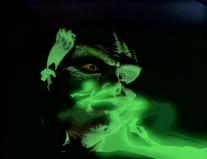 Not-So-Classic Episode: Crazy As A Soup Sandwich Not-So-Classic Episode: Crazy As A Soup SandwichOriginal Air Date: 1/4/1989 Writer: Harlan Ellison Director: Paul Lynch Synopsis: Although Harlan Ellison left the revival series in acrimonious circumstances, his friend Stracyznski was able to buy a script from the man who once gave us the outstanding Paladin of the Lost Hour. Sadly, this broad farce, childishly played, is nowhere near the same quality. The third season of the 80s show didn't have a very good start, with the first five episodes being below-par efforts. After that, however, it had a pretty good run, with maybe only or two bad ones in a stream of watchable, if not stellar, efforts. This is the worst of seven weak episodes, however, just edging out season opener The Curious Case of Edgar Witherspoon. Comedy was always a bad fit for this show, and neither of the two stories do anything to disprove this. Rating: * * |